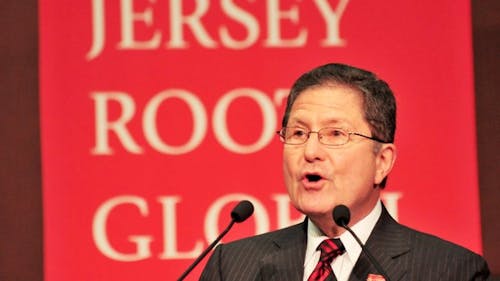Public hits president with concerns after address

University President Richard L. McCormick responded to public concerns and suggestions in a question and answer session following his 2009 Annual Address Friday in the Rutgers Student Center on the College Avenue campus.
How would you increase the number of student veterans at the University?
Richard L. McCormick: We're working extensively with all three of our campuses to increase the numbers of veterans that are currently here. Like you said, there are only 438 — it could be a lot more. Through outreach of designated admissions officers to veterans as their leaving service or to veterans while they're still in service, through the reliance on veteran students themselves to speak to their peers about what a great place Rutgers is to get an education, through Web sites and continuing publications directed at veterans who are seeking or whom we hope will seek to continue their education, we would love to expand considerably the 438 who are here now.
There is no yellow-ribbon funding or G.I. Bill aid — federal funds for veterans to go to college after service — for University graduate students, only undergraduates. Would you change this policy like other peer institutions?
RM: I am not familiar with the constraints upon yellow-ribbon funding for graduate students. I think you've got it right, but I need to look into the reasons for it and whether we can change it.
Many veterans on campus are on active duty, in the reserves, deal with medical examinations and have difficulty balancing school and military life. Would you consider notifying faculty and staff to be more flexible and sensitive to these students?
RM: With respect to your request for flexibility and sensitivity from faculty, I will shoot an e-mail with exactly that message. Faculty will of course relay their own decisions about their classrooms and their students — that's part of our culture at Rutgers — but I know by knowing this faculty and the cultures they share and the beliefs they have that they'll be responsive to that.
The University's professional schools have higher tuition rates than other schools, making it difficult for students to pay and limiting more applicants. Would you change this?
RM: As I said in my prepared remarks, I do believe that in appropriate circumstances, differential tuition is the right way to go … and that's probably not going to change. The answer to the problem though is one I also mentioned in my prepared remarks, which is obtaining additional support for need-based financial aid, including for students in those professional programs.
Where would the funds the University received from the federal stimulus package go?
RM: There's going to be a huge amount of accountability for that stimulus money both within Rutgers and across the country. Let me give you a quick sketch of this. It's coming to Rutgers in three different ways. First of all, through student financial aid, and here of course it comes not directly to Rutgers but to our students. The amount of money for Pell grants for example has increased. … The second thing that's happening is a lot of the money is going for scientific research, allocated through the usual, federal scientific agencies such as the National Science Foundation and the National Institutes of Health. … Some of it is reflected in the $391 million in research grants that I bragged about in my remarks, but even more of it is going to come in the year ahead. The third way federal stimulus money affects us … is the $15.4 million that has come from the federal government to New Jersey and from New Jersey to Rutgers, which has enabled New Jersey to keep our base budget hole for the current year.
More than 1,500 students live in the Quad residence halls on Livingston campus, yet there is no REXL bus stop there. Would you consider installing one?
RM: I'm well aware of the problem. I will circle that to Jack Molenaar who heads up our Division of Transportation and ask him the reasons for yay and the reasons for nay and see what we get.
Why were there no events scheduled on Livingston campus last year for Rutgers Day? Will there be this year?
RM: With respect to having Rutgers Day on the Livingston campus, we are looking into that, and there's no principle objection to doing it. The problem is the risk of dispersing and scattering the 50,000 … people over what is already a pretty significant geographic area, from the far reaches of Cook/Douglass to College Avenue and Busch [campuses].
Note: The questions were paraphrased from those posed by audience members; McCormick's responses are not.



